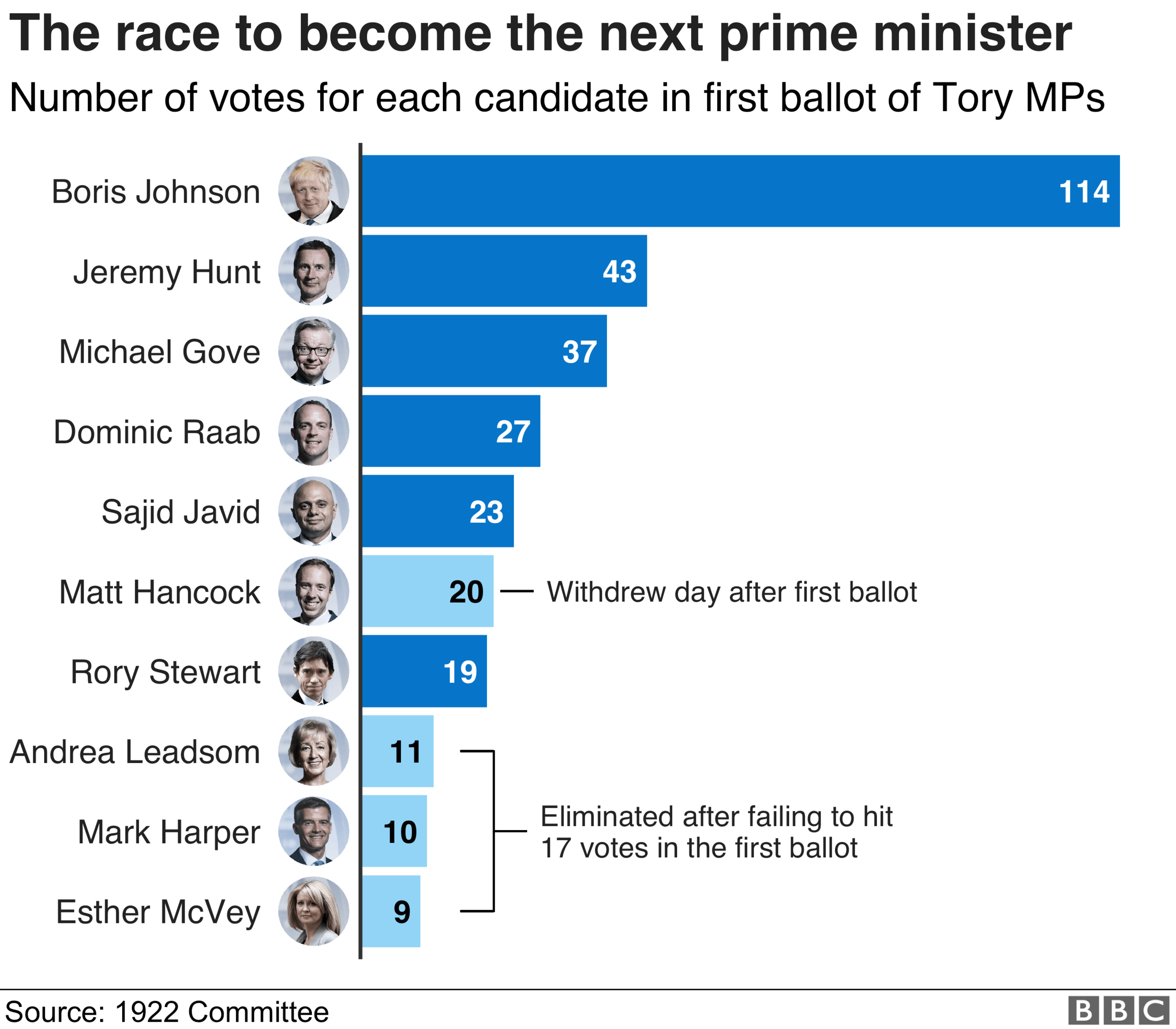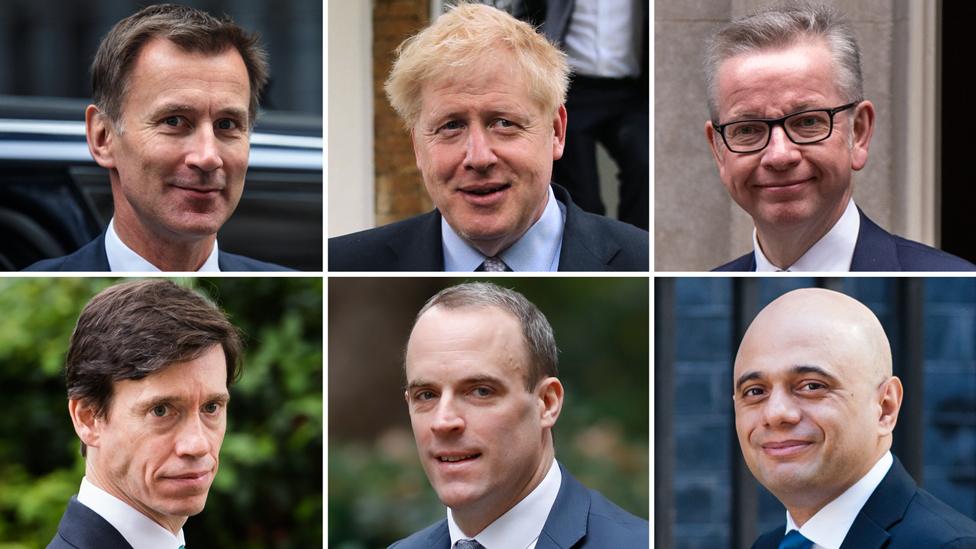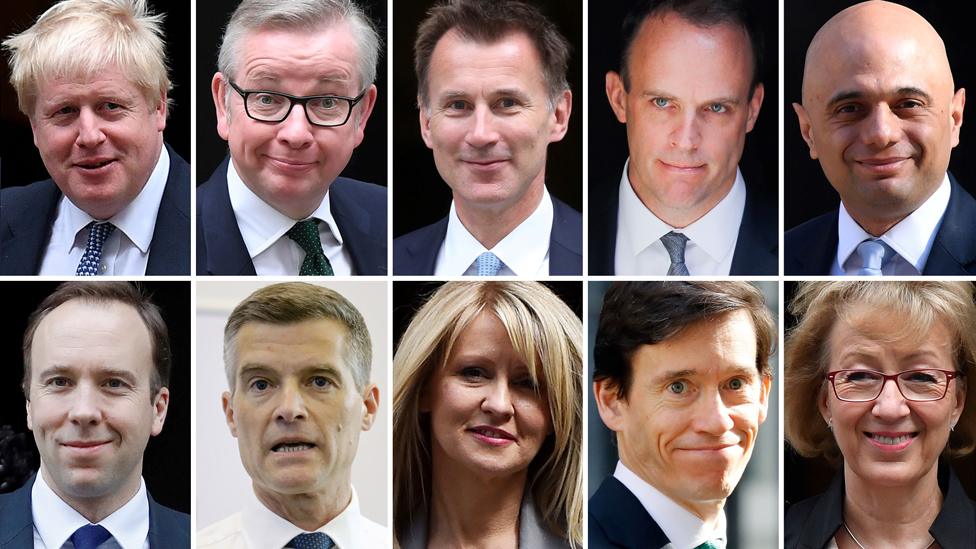Tory leadership: Matt Hancock quits contest
- Published
- comments
Matt Hancock withdraws from leadership race
Matt Hancock has quit the contest to become Conservative leader - and prime minister - a day after coming sixth in the first ballot of the party's MPs.
The health secretary did not endorse any of his former rivals, but told the BBC he was "talking" to them all.
Mr Hancock, who had been the youngest contender, said he was "focused on the future" but the party needed a leader to succeed in "the here and now".
Boris Johnson won the first Tory MPs' ballot by a big margin, with 114 votes.
His nearest rival, Foreign Secretary Jeremy Hunt, got 43 votes.
The final two contenders remaining after further MPs' ballots next week will go to a party-wide vote.
But cabinet minister David Lidington - who had backed Mr Hancock - told the BBC's Political Thinking with Nick Robinson podcast: "The Conservative Party started having elections for its leaders in 1965. Only once in that time has the favourite won and that was when Michael Howard was unopposed.
"I think it's still very open and no candidate can take things for granted - and shouldn't."
Three candidates - Mark Harper, Andrea Leadsom and Esther McVey - were knocked out in the first round, in which Mr Hancock, aged 40, received 20 votes.
His decision to withdraw from the race means six candidates remain.
Mr Hancock told BBC deputy political editor John Pienaar: "I've been incredibly encouraged and humbled by the amount of support that I've had in this campaign.
"I've tried to make the argument about the values that the Conservative Party needs to hold dear, of free enterprise and support for a free society and being open and optimistic and enthusiastic about the future."


He added: "But the party clearly is looking for a candidate to deal with the here and now. I very much put myself forward as the candidate focused on the future.
"And so I've decided to withdraw from the race and instead see how best I can advance those values within the party and the big and difficult tasks we've got ahead."
Mr Hancock said the remaining candidates all had "admirable qualities" and that all should take part in televised debates: "The nature of this contest isn't just to be the leader of the Conservative Party. It's to be the next prime minister, and so that scrutiny is important."
He added: "We stand at a defining moment in our country's history and we need to deliver Brexit, and then we need to cast forward and bring the country together. That's the goal."
Further ballots are scheduled to take place next Tuesday, Wednesday and Thursday to whittle down the contenders until only two are left. The process could be speeded up if anyone else drops out.
The final pair will be put to a vote of the 160,000 members of the Conservative Party from 22 June. The winner is expected to be announced about four weeks later.
Meanwhile, Mr Johnson, the former Foreign Secretary and London Mayor, has confirmed that he will take part in a televised debate with other candidates on the BBC on Tuesday - although it is not known whether he will join Sunday's debate on Channel 4.
He picked up support from businessman Lord Sugar - who quit as a Labour peer in 2015 and sits as a crossbencher:
Allow X content?
This article contains content provided by X. We ask for your permission before anything is loaded, as they may be using cookies and other technologies. You may want to read X’s cookie policy, external and privacy policy, external before accepting. To view this content choose ‘accept and continue’.
Fellow leadership contender Dominic Raab, a former Brexit Secretary, called for a "proper debate", saying: "I'm looking forward to the first televised debates on Sunday and I hope that everyone gets involved - we should have a proper debate on the vision for the country."

The UK's next prime minister






On Tuesday 18 June, BBC One will host a live election debate between the Conservative MPs still in the race.
If you would like to ask the candidates a question live on air, use the form below. It should be open to all of them, not a specific politician.
If you are reading this page on the BBC News app, you will need to visit the mobile version of the BBC website, external to submit your question on this topic.
- Published13 June 2019

- Published13 June 2019
